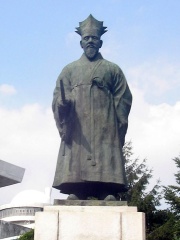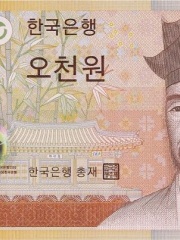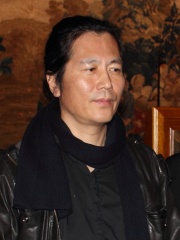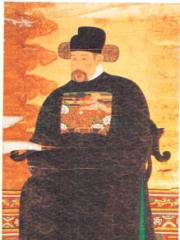



The Most Famous
PHILOSOPHERS from South Korea
This page contains a list of the greatest South Korean Philosophers. The pantheon dataset contains 1,267 Philosophers, 5 of which were born in South Korea. This makes South Korea the birth place of the 37th most number of Philosophers behind Latvia, and Portugal.
Top 5
The following people are considered by Pantheon to be the most legendary South Korean Philosophers of all time. This list of famous South Korean Philosophers is sorted by HPI (Historical Popularity Index), a metric that aggregates information on a biography's online popularity.

1. Yi Hwang (1501 - 1570)
With an HPI of 67.75, Yi Hwang is the most famous South Korean Philosopher. His biography has been translated into 26 different languages on wikipedia.
Yi Hwang (Korean: 이황; Hanja: 李滉; 1501–1570) was a Korean philosopher, writer, and Confucian scholar of the Joseon period. He is considered the most important philosopher of Korea - he is honored by printing his portrait on the 1000 South Korean won banknote, on the reverse of which one can see an image of his school, Dosan Seowon. He was of the Neo-Confucian literati, established the Yeongnam School and set up the Dosan Seowon, a private Confucian academy. Yi Hwang is often referred to by his art name Toegye ("Retreating Creek"). His courtesy name was Gyeongho. His interpretation of Neo-Confucianism was influential not only in Korea, but also in Japan, Taiwan, and Vietnam, and is now being studied even in the mainland China. His main work, Ten Diagrams on Sage Learning, originally published in classical Chinese language, has been already translated into modern Korean, Japanese, Vietnamese, English, French, German, Russian and Polish. Some of his writings were looted by the Japanese military during the Japanese invasion of Korea.

2. Yi I (1536 - 1584)
With an HPI of 66.67, Yi I is the 2nd most famous South Korean Philosopher. His biography has been translated into 29 different languages.
Yi I (Korean: 이이; Hanja: 李珥; 1536–1584) was a Korean philosopher, writer, and Confucian scholar of the Joseon period. Yi is often referred to by his art name Yulgok ("Chestnut valley"). He was also a politician and was the academical successor of Cho Kwangjo.

3. Byung-Chul Han (b. 1959)
With an HPI of 64.75, Byung-Chul Han is the 3rd most famous South Korean Philosopher. His biography has been translated into 28 different languages.
Byung-Chul Han (born 1959) is a South Korean-born philosopher, Catholic theologian and cultural theorist living in Germany. He was a professor at the Berlin University of the Arts and still occasionally gives courses there. His work largely centers around critiques of neoliberalism and its impact on society and the individual. Although he writes in German, his books have been best received in the Hispanosphere.

4. Yun Hyu (1617 - 1680)
With an HPI of 61.95, Yun Hyu is the 4th most famous South Korean Philosopher. His biography has been translated into 19 different languages.
Yun Hyu (Korean: 윤휴; Hanja: 尹鑴; 1617–1680) was a Korean Neo-Confucian scholar and official, who lived during the Joseon period. Yun was the political leader of the Southern (Namin) faction of the Joseon Dynasty. His pen names were Paekho, Hahŏn and Yapo.

5. Jaegwon Kim (1934 - 2019)
With an HPI of 56.32, Jaegwon Kim is the 5th most famous South Korean Philosopher. His biography has been translated into 21 different languages.
Jaegwon Kim (September 12, 1934 – November 27, 2019) was a Korean-American philosopher. At the time of his death, Kim was an emeritus professor of philosophy at Brown University. He also taught at several other leading American universities during his lifetime, including the University of Michigan, Cornell University, the University of Notre Dame, Johns Hopkins University, and Swarthmore College. He is best known for his work on mental causation, the mind-body problem and the metaphysics of supervenience and events. Key themes in his work include: a rejection of Cartesian metaphysics, the limitations of strict psychophysical identity, supervenience, and the individuation of events. Kim's work on these and other contemporary metaphysical and epistemological issues is well represented by the papers collected in Supervenience and Mind: Selected Philosophical Essays (1993).
People
Pantheon has 5 people classified as South Korean philosophers born between 1501 and 1959. Of these 5, 1 (20.00%) of them are still alive today. The most famous living South Korean philosophers include Byung-Chul Han. The most famous deceased South Korean philosophers include Yi Hwang, Yi I, and Yun Hyu.
Living South Korean Philosophers
Go to all RankingsDeceased South Korean Philosophers
Go to all RankingsYi Hwang
1501 - 1570
HPI: 67.75
Yi I
1536 - 1584
HPI: 66.67
Yun Hyu
1617 - 1680
HPI: 61.95
Jaegwon Kim
1934 - 2019
HPI: 56.32

